ONE DAY AT A TIME Review
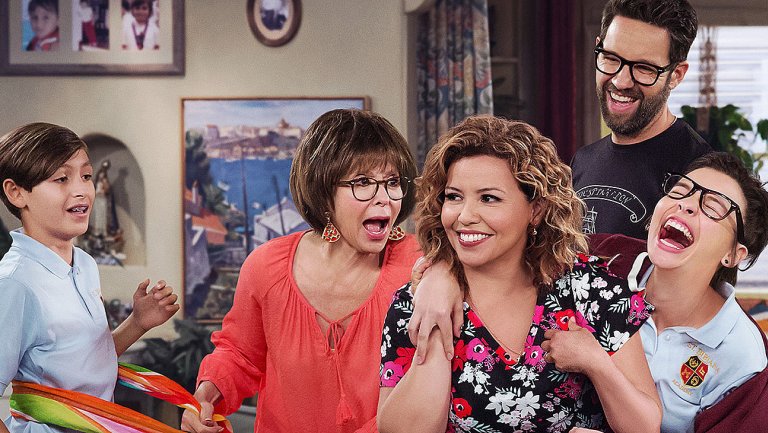
When I first heard about this show, it did not even cross my mind that I wouldn’t watch it. How many Latino sitcoms and comedies (or any other kind of content, for that matter) are out there? As a Mexican-Cuban-American (what a mouthful), I am well aware that there is not nearly enough content out there that represents all of the diverse Latinos who have rich culture, backgrounds and stories to share. Latinos still have little representation in film and television — we always play the undocumented gardener, the maid, the cholo, or the sexy bombshell with a heavy accent. The inaccurate mold Hollywood has set for Latinos is now hopefully disappearing. When I mentioned the show to my own family, the first thing my mother said was, “The only other Cuban I can think of that had a show was Desi Arnaz.”That was over 50 years ago. A show that is distinctly about a Cuban-American family, and not just a hodge-podge of random stereotypical Latino culture, is long overdue.
ONE DAY AT A TIME is a reboot of the original Norman Lear 1970s multi-cam sitcom. Netflix brought it back with Lear as executive producer and a Cuban family at the forefront. In the gentrified Echo Park neighborhood of Los Angeles, Penelope Alvarez (Justina Machado), a badass single mother and military veteran, raises her feminist teenage daughter, Elena (Isabella Gomez), and charming tween son, Alex (Marcel Ruiz), with the help of her traditional mother, Lydia (the incomparable Rita Moreno). Their landlord and close friend, Schneider (Tod Grinnell) acts as a support system and comedic relief. Essentially, the season follows the family over the course of many months as they prepare for Elena’s upcoming quinceañera (a lavish party thrown for a girl’s 15th birthday as she comes of age and becomes a woman). The last episode culminates with the big day.
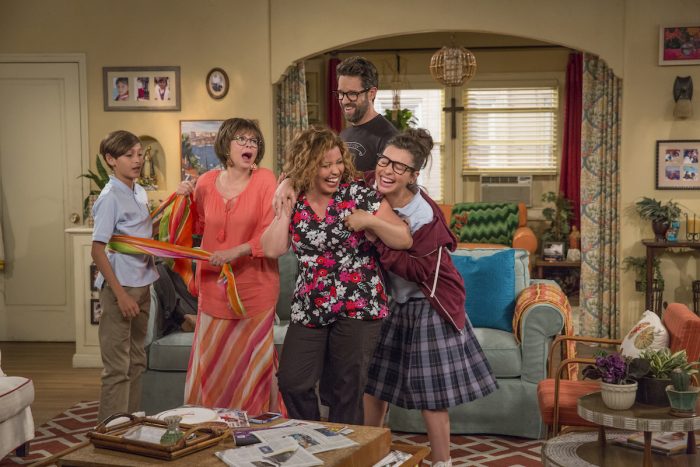
Fact: If you start playing music in a room full of Cubans, they will start dancing uncontrollably
Sitcoms have gotten a bad reputation lately. I admit that even I had my doubts when I heard the laugh track in the pilot. However, this show digs below the surface level of the genre to reveal what the heart of the show is: what it means to be in a family, be honest with them and yourself, learn when to trust others (and when not to), and what it means to fully accept another person for who they are. Each episode tackles a topic that is not only relevant to the characters, but speaks to issues many of us face. Some of the issues brought up include: mental health/depression; feminism; healing; questioning identity and culture; religion; immigration/being undocumented; the difficulty for veterans to receive help; racism; what it means to be Cuban and renouncing your home country; coming out to your family; acceptance. These are pretty serious topics for a show with a laugh track, but they hold relevance not just to Cubans, not just to Latinos, but to anyone who has ever dealt with any of these issues. Even if you don’t relate to any of these topics, it is still a sharp, witty show worth learning from.
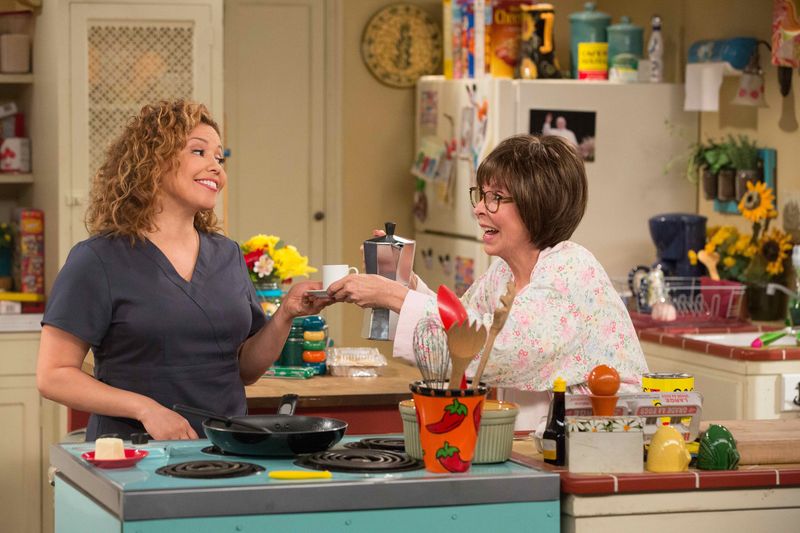
Fact: A cafecito a day keeps the doctor away. Not really, but it’s still delicious
The audience is thrown right into the story and the characters’ problems from the start of the pilot. Lydia begs Elena to learn to speak Spanish, to which she retorts, “I’ll learn Spanish when you learn English.” I was taken aback by the serious turn the show took, as it had just made a joke about Lydia’s accent. That’s when I knew this would not be an average sitcom. It became clear that the writers were not going to skirt around the issues they presented, but face them head on.
Perhaps one of the most poignant scenes is when Lydia dresses up as a Flamenco dancer, castanets and all. When asked about how she left Cuba, she is all smiles and gives a vague response. However, when pushed with questions, dark memories come rushing up and Lydia is overwhelmed with emotion. Only those who have been forced to flee their home country understand how it must feel to be stripped of everything you have, including language, in order to survive in a new country. Lydia reveals she was part of a program in Cuba in which children were brought to this country to be kept safe. Heartbreakingly, she was forced to leave behind her family and a sister nobody else ever knew about. This personal story rings true with the stories of the countless Cubans forced to flee when Castro took over, my own grandparents’ and father’s story included. More than anything, this storyline is what made me realize the show is also about healing.
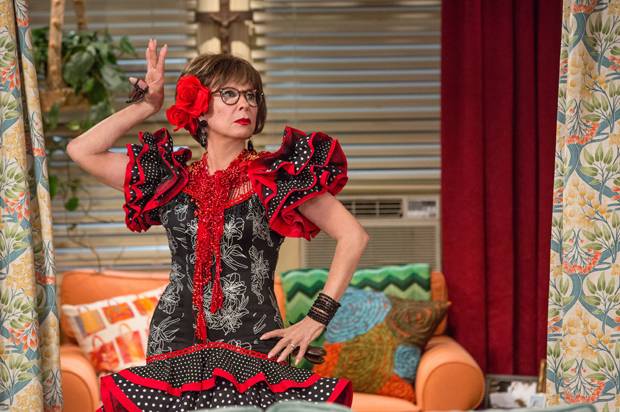
I dare you to not dance to “Azucar Negra” by Celia Cruz and Lydia’s daily alarm clock
ONE DAY AT A TIME captures important aspects of what it’s like to grow up Latino in America, as well as what being Cuban-American means with all the carefully placed details sprinkled in. However, it took me several episodes to adjust to the fact that it is a Cuban family played by Puerto Rican actors. It is not a big deal to anyone who does not recognize or distinguish between different Latino accents. Everyone always asks, “But Marisol, isn’t it all Spanish?” Yes, but not all of us speak Spanish the same way. Just as people from different parts of this country speak with different accents and slang, the same goes for Latin American countries. Nevertheless, I quickly let it go when it became clear that the actors had captured the essence of who these characters were. They were able to accurately portray Cubans sans eye-rolling stereotypes or exaggeration.
It serves as a reminder that Latinos are real people that can hold their own in film and television in lead roles. It is time to stop being reduced to the stereotypes we’ve long been forced into. Latinos are incredibly diverse, as they come from so many different countries. I cannot discuss this show without discussing the duality of living as a Latino and as an American. As any child of immigrants understands, it can sometimes be a struggle to live both lives. You never feel as if you completely fit in on one side or the other, nor do you feel completely accepted by either. It can sometimes be a constant struggle between traditions, cultures, and your ideals.With that being said, ONE DAY AT A TIME successfully captures what it is like to be a Cuban and American family. Few other shows have discussed and depicted this struggle, but a few that come to mind are MASTER OF NONE, JANE THE VIRGIN, and BLACKISH.
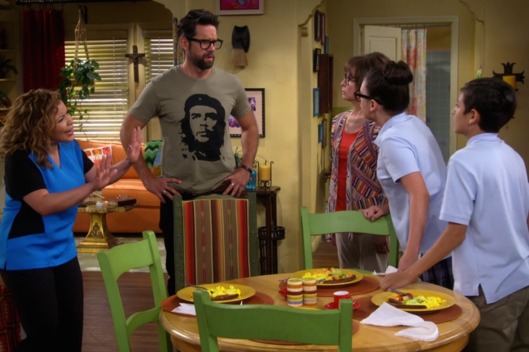
Bless this scene for calling out who wear Che Guevara shirts
Overall, ONE DAY AT A TIME was a success in achieving what it wanted to achieve. Not only can it inform and teach audiences about important present-day issues, it also provides a certain nostalgia of growing up Latino, is capable of making fun of itself, and made me feel connected as I saw myself, and other people I know, in the various characters’ mannerisms and personalities. With all the complicated layers to the characters and story, I recommend the show. The 13 episodes are worth the watch to step into the characters’ lives and find something that is relatable or speaks to you. Producer and writer Gloria Calderón Kellett seems to have a lot up her sleeve and I look forward to seeing more of her work.
Verdict: Recommend




I can’t wait for the second season. This is a family show where we all sat together, laughed, and related to it. Keep them coming!